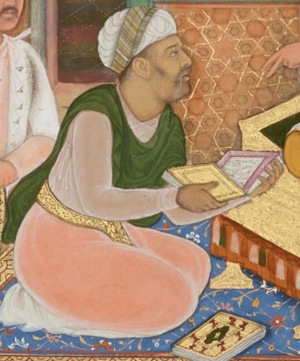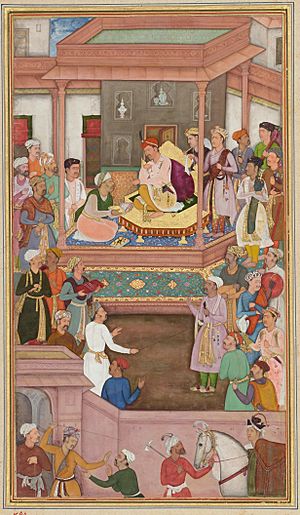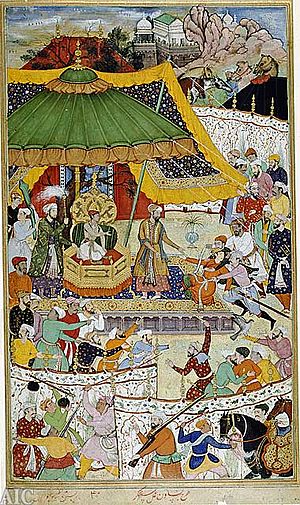Abul Fazl facts for kids
Quick facts for kids
Abul Fazl
|
|
|---|---|

Portrait of Abul Fazl by Govardhan
c.1602–1605. |
|
| Grand Vizier of the Mughal Empire | |
| In office 1579 – 22 August 1602 |
|
| Monarch | Akbar I |
| Preceded by | Muzaffar Khan Turbati |
| Succeeded by | Sharif Khan |
| Personal details | |
| Born | 14 January 1551 Agra, Mughal Empire (modern-day Uttar Pradesh, India) |
| Died | 22 August 1602 (aged 51) near Gwalior, Malwa Subah, Mughal Empire (modern-day Madhya Pradesh, India) |
| Cause of death | Assassination |
|
Notable work
|
|
| Relations | Faizi (brother) |
Abu'l-Fazl ibn Mubarak, also known as Abul Fazl, was an important Indian writer, historian, and politician. He served as the top minister, called the grand vizier, for the Mughal Empire. He held this powerful position from 1579 until his death in 1602.
Abul Fazl was born on January 14, 1551, and passed away on August 22, 1602. He was famous for his writings, especially the Akbarnama and Ain-i-Akbari. He also translated the Bible into Persian.
Emperor Akbar highly respected Abul Fazl. He was known for his idea called Padshahat. This idea said that the emperor was chosen by God. Therefore, the emperor could not be removed and worked for the good of his people.
Abul Fazl was one of the Nine Jewels in Akbar's royal court. These were nine very talented people who advised the emperor. He was also the brother of Faizi, a famous poet.
Contents
Abul Fazl's Life Story
Abul Fazl and his older brother, the poet Faizi, were born in Agra. Abul Fazl started learning Arabic at a young age. By the time he was five, he could already read and write well.
His father, Shaikh Mubarak, taught him many things about Islamic sciences. However, Abul Fazl found traditional learning difficult. He sometimes felt sad and confused about his studies.
A friend helped him overcome these feelings, and he continued his learning. His early life showed how brilliant he was. Once, he saw a dictionary that had been partly eaten by insects. He carefully filled in the missing parts. Later, when the complete book was found, his version was almost exactly the same.
Abul Fazl joined Emperor Akbar's court in 1575. He greatly influenced Akbar's ideas, making them more open-minded about different religions. This happened especially in the 1580s and 1590s.
In 1599, Abul Fazl became a military commander in the Deccan region. He was very good at leading the Mughal army. He fought in wars against other kingdoms there, known as the Deccan Sultanates.
Abul Fazl's Early Years in His Own Words
Abul Fazl wrote about his first twenty years in his book, the A'in-i-Akbari. He described his birth on January 14, 1551. He said he could speak clearly at just over one year old. By age five, he had learned a lot and could read and write.
He mentioned that he struggled with regular school lessons. He often felt confused and couldn't express his doubts. He would even cry in public because of this.
Then, he met a helpful friend who changed everything. This friend encouraged him to go to college. There, his mind became clearer, and he started to understand things better.
He felt that he had a special gift for learning. His father's guidance also helped him a lot. For ten years, he studied day and night. He didn't care about hunger or comfort, only about gaining knowledge.
He was amazed that he could sometimes go days without eating. He believed his love for study made him forget about food. People were surprised by his dedication.
Abul Fazl also wrote about the damaged dictionary. He explained how he filled in the missing parts. When the full book was found, his work was almost perfect. This showed his incredible memory and understanding.
By age twenty, he felt truly independent in his thoughts. He joined Akbar's court, where his talents were recognized. He felt his ideas were now valued and used.
He wrote that he hoped his life would continue to be guided by God. He wished to spend his final moments doing God's will.
Abul Fazl's Important Books
Abul Fazl wrote several important books. These works tell us a lot about the Mughal Empire and Emperor Akbar.
The Akbarnama

The Akbarnama is a huge historical record of Akbar's rule. It has three main parts. The first part tells the history of Akbar's ancestors, from Timur to Humayun.
The second part covers Akbar's reign up to the year 1602. The third part is called the Ain-i-Akbari. It describes how Akbar's empire was managed. This part also includes details about Abul Fazl's own life.
Other Writings
Abul Fazl also wrote Ruqaʿāt, which is a collection of his personal letters. These letters were sent to important people like Akbar, his sons, and his family. His nephew later put these letters together.
Another work is Inshā-i-Abu'l Fazl. This book contains official messages written by Abul Fazl. It includes letters from Akbar to other rulers and letters from Abul Fazl to Akbar and other nobles.
Ideas on Governance and Leadership
Abul Fazl was very interested in how to keep society stable and peaceful. In his Ain-i-Akbari, he shared his ideas about how a ruler should govern.
The Idea of Padshahat
Abul Fazl's special idea was called 'Padshahat'. He explained that 'Pad' means stability, and 'shah' means owner. So, a 'Padshah' is an established owner who cannot be removed.
He believed that the Padshah, or emperor, was sent by God. The emperor's job was to work for the good of his people. He had to keep peace and harmony throughout his empire.
Abul Fazl thought that the king had absolute power. He was the final authority in all areas, like government, farming, and education. No one could challenge the king's power or share it.
Sulh-I-Kul: The Doctrine of Peace
Abul Fazl also promoted the idea of 'Sulh-I-Kul', which means "universal peace" or "peace for all." He believed that a ruler's power should not be limited to one religion.
Since the king was seen as God's agent, he should not treat people differently based on their faith, caste, or social class. If a king did this, he would not be considered fair.
Abul Fazl encouraged good values from all religions. He brought them together to help maintain peace in society. He wanted people to be free from narrow-minded ideas. This idea also helped explain why Akbar was a fair and logical ruler.
Abul Fazl's Death
Abul Fazl was killed in 1602. He was returning from the Deccan region when he was attacked. This happened near Gwalior.
The attack was planned by Akbar's oldest son, Prince Salim. Prince Salim later became Emperor Jahangir. Abul Fazl was known to be against Prince Salim becoming the next emperor.
Abul Fazl was buried at Antri. His son, Shaikh Afzal Khan, later became the governor of Bihar in 1608, appointed by Emperor Jahangir.
 | James B. Knighten |
 | Azellia White |
 | Willa Brown |



